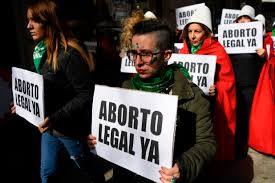Abortion in Latin America
The practice of reproductive autonomy among women continues to be heavily restricted by states throughout the world. More specifically, Latin America is recognized as a region where access to abortion is highly limited and, in some cases, nonexistent. In the following sections we will explore the current legal state of abortion in countries like El Salvador, Mexico and Argentina.
For a thorough overview of abortion access in Latin America, please check out this video.
https://www.youtube.com/watch?v=WdT06QW26Tg
Want to see where abortion is allowed, restricted or outlawed? Click through this interactive map to find out.
http://worldabortionlaws.com/
Links to additional relevant NGOs
http://catolicasmexico.org/ns/
http://www.ddeser.org
http://iwhc.org
http://www.abortolegal.com.ar
Sources to Consult
https://www.vox.com/2018/6/13/17460824/argentina-abortion-bill-ni-una-menos
https://elpais.com/elpais/2017/03/08/inenglish/1488965609_348675.html
https://www.nytimes.com/2018/04/09/world/americas/el-salvador-abortion.html
El Salvador
Initially, the 1973 Salvadoran Penal Code permitted abortion in the context of rape, statutory rape, fetal deformity and life risks to the mother. This, however, changed in the 1990s as both the media and the Catholic Church began to influence the Legislative Assembly to pass an absolute ban on abortion. In 1998, all of the included exceptions were banned, making abortion illegal in all circumstances (Alvarez 677-679)
The current Salvadoran Penal Code includes the following:
-2 to 8 year sentence for those that perform an abortion on their own or that consent to having it done by another person. The same sentence applies to the person performing the abortion even with the mother’s consent.
-4 to 10 years “[w]hen the woman does not give her consent, or consent is obtained through violence or deceit, the punishment is four to ten years in prison.”
-6 to 12 years for doctors, pharmacists, or medical assistants that perform an abortion.
-2 to 5 years for “[a]nyone who persuades a woman to undergo an abortion or who facilitates the abortion through economic or any other means”. This sentence is increased by ⅓ if the persuader is the father.
-6 months to 2 years for unintentional abortions. (Alvarez 679)
Case of “Glenda Liseth”
In 2007, a 19-year-old single mother by the name of Glenda Liseth was sentenced to four years in prison for manslaughter after having a miscarriage. It all started when Glenda began feeling stomach pains and proceeded to an outhouse to relieve herself. Once there, she felt her body had ejected tissue. Shortly after, she fainted as she tried to retrieve it. When she was taken to the hospital, the doctors reported her miscarriage as an abortion to authorities. The courts ruled against her claiming that she should have gone to the hospital (instead of the bathroom) since she was pregnant. She was sentenced for unintentional “murder”. Her first daughter was then placed in an orphanage. (Viterna 248)
Testimony from one of the many women seeking clandestine abortions in El Salvador:
I came in and was told to lie down. It was not even a bed. She came with a piece of cloth and put it underneath my nose, and I felt a little numb. She came back with a long wire, like a TV antenna. It was not like a doctor’s instrument. It was just a wire tube with another wire inside it. She put some oil on it and told me to breathe deeply. She put it in. And she was scraping around. I was supposed to be asleep. But I felt pain. I told her it hurt. She said, “Yeah, we’re almost done.” But she kept scraping around, and I said: “No, no, stop. It’s hurting me.” Then she said, “It’s done.” She said I would have a fever and I should not go to the doctor or they would report me. (Alvarez 676)
Mexico
After the Mexican Revolution (1910-1920) ended, the government officially took on a pronatalist stance on reproductive law. This was largely due to the fact that country’s population had vastly diminished during the war, and therefore needed to be revitalized by a growing birth rate. However, in the 1974, the feminist movement in Mexico— under the slogan of “Voluntary Motherhood”— successfully campaigned for the government to reverse its pronatalist policy and institutionalize family planning. After decades of organizing, legal exceptions that allowed for abortion under specific circumstances were established throughout the country. In 2007, Mexico City decriminalized abortion and granted the right to receive abortion services (under any circumstance) so as long as it is within the first 3 months of gestation (Singer 16).
Currently, the Mexican Penal Code allows for abortion only under a certain circumstances (exceptions), and these latter vary from state to state. Here is a list of all exceptions:
-“the abortion is the result of negligent behavior on the part of the pregnant woman (valid in twenty-nine states);
-to save the life of the pregnant woman (valid in twenty-seven states);
-the fetus has serious genetic malformations (valid in thirteen states);
-to protect the health of the pregnant woman (valid in ten states);
-the pregnancy is the result of non-consensual artificial insemination (valid in eleven states); and
-where the woman already has three other children, for economic reasons (valid only in Yucatán)” (“Women’s Human Rights: Abortion”).
The only exception in which abortion is allowed nationwide is in the case of rape. However, even in such circumstances, there are many obstacles that make it virtually impossible for rape victims to access abortion services. One of the biggest barriers is the lack of knowledge on the guidelines to follow in order to get an abortion. As Human Rights Watch reports, although “pregnant rape victims do still ask the authorities for assistance in terminating their unwanted pregnancy… those designated to assist pregnant rape victims, social workers and public prosecutors actively discouraged women and girls from seeking legal abortion services” (“The Second Assault: Obstructing Access to Legal Abortion after Rape in Mexico”).
Mexico City becomes a Reproductive Rights oasis:
In 2007, Mexico City became the only location in the country to allow abortion (without circumstantial restrictions) up to the third month of gestation. Because the law allows for women residing outside of the city to make use of abortion services, Mexico City has become a hub for women travelling from stricter states in need of abortions.
LEYES ABORTO EN LOS ESTADOS REPUBLICA MEXICO
Testimony “Viane”
Twenty year-old Viane travelled from her home state of Guanajuato (one of the strictest states) to Mexico City seeking an abortion at almost 11 weeks of pregnancy. Here’s her story as relayed by Elyse Ona SInger:
“Viane worked in a clothing store in Guanajuato earning 700 Mexican pesos a week ($38 USD). She was pregnant by her boyfriend, a man nine years her senior who was married with three small children. While her boyfriend had promised to support her with the new baby, she explained that she sensed his growing distance upon learning of her pregnancy and she did not trust his word. Although he had discouraged her from ending the pregnancy, Viane saw no other option. As if in response to him, during our conversation in the clinic she asked aloud rhetorically: ‘What can one do with 700 pesos a week? With rent and food, diapers for two, milk for two, clothing for two, and there’d be three of us including myself. It would be really hard…I’ve gone to Church and maybe I’m doing something wrong in their [Catholic priests] view, but the way I see it–it’s not that I’m excusing it but–I’m going to bring a baby into the world for what? So it is undernourished, sick…so I wouldn’t have clothing to dress him, or diapers, or milk, so I wouldn’t be able to take care of either of them’… She reflected aloud: ‘It’s a hard decision … I know I’m coming here to kill a living being, but at the same time, how I see it, it’s not the same as killing my one-year-old son… I would have to sacrifice one to take care of the other…[c]atholic leaders have always had their beliefs, that abortion is wrong, it’s asin, God will punish you… They never put themselves in your place, they always judge… Let them say what they will, these people are not going to support me, they are not going to put food on my table…Maybe [abortion] is a sin but [under certain circumstances] one has to do it, one needs to do it. And one keeps believing in what they believe, that doesn’t change’’’ (Singer 23-24).
Argentina
Amendments to the complete ban on abortion of the 1880s came into effect in 1922. This latter allowed for abortion in the cases in which the pregnant individual’s life was at risk, the pregnancy was result of rape, or the pregnant individual had a mental disability.
During the military dictatorship of the late 70s and early 80s, the penal code became stricter and restricted access to cases of “grave” risk to the woman’s life/health. The country went back to the 1922 penal code after the end of the dictatorship with one small, yet significant, change: abortion would be allowed in cases of rape of women with mental disabilities.
An important barrier to accessing abortion services are the Bioethics Committees who are responsible for assessing all abortion requests for approval. These committees often include religious clergy whose biases can influence the committee’s decision.
In addition to that, the protocol by which a request to an abortion must be submitted, reviewed and then approved is long and bureaucratic. Given that the need for an abortion is time-sensitive, this can prove to be a risk and a deterrent for many pregnant individual seeking services.
Such was the case of a 17 year-old by the name of Noelia who was sexually abused by her father and consequently became pregnant. Noelia, who also suffered from an intellectual disability, deemed that it was in her best interest to file a request for an abortion. After six weeks of back-and-forth between the committee, psychologists and medical professionals, no decision had yet been made. Although her case met the second exception of the penal code, the committee still felt hesitant to approve her request. Noelia (who had then passed her 15th week of pregnancy) decided to keep the baby out of fear that a late-term abortion would endanger her life (Irrazabal 747).
In a similar case, a young pregnant woman (Ana Maria Acevedo) from Santa Fe, Argentina was diagnosed with cancer. Even though her chemotherapy treatment and pregnancy were incompatible, the bioethics committee denied her request to get an abortion. The woman died shortly after. (Irrazabal 744)
Important Update (August 14th, 2018): The Argentine Chamber of Deputies (lower chamber os congress) passed a bill that would legalize elective abortion up to the 14th week of pregnancy. This bill still needs to be approved by the senate, but the president of the country has expressed no plan to oppose it if approved by congress. Although the senate is considerably more conservative, many see this initial approval as a great victory for reproductive right in Argentina and all of Latin America (Politi & Ellis, 2018).
*The Argentine Senate rejected the bill in August, 2018.
https://www.nytimes.com/2018/08/09/world/americas/argentina-abortion-laws-south-america.html
Abortion in Latin America
Testimonials
Testimonies in Spanish:
http://larevuelta.com.ar/codigorosacompressed.pdf
ARTivism via Mano Peluda:

